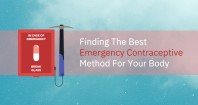Few men want to talk about their inability to get or maintain an erection, however, erectile dysfunction can have a profound impact on relationships and self-esteem. Fortunately, trouble in the bedroom doesn't necessarily mean you're dealing with erectile dysfunction. Most men will have problems with an erection at some point in their sexual history. But one bad day in the bedroom doesn't mean major sexual health problems. So how can you know if you're dealing with erectile dysfunction?
"Although it might not be possible to always prevent erectile dysfunction, taking care of yourself can help you avoid persistent problems."
Erectile dysfunction (ED) is a common problem. According to the National Kidney and Urologic Diseases Information Clearinghouse, up to 30 million men each year experience occasional ED. ED in younger adult men is often temporary. However, the incidence increases with age. Four percent of men over the age of 50 and more than 17 percent of men in their 60s experience a total inability to get and maintain an erection. However, ED is not a natural consequence of aging, and it doesn’t have to ruin your sex life.
Signs of erectile dysfunction
Your ability to become aroused is a complicated process. Your emotions, brain, hormones, nerves, blood vessels, and muscles all play an intricate part in male arousal. When any of these pieces aren't in line, it can cause some kind of dysfunction.
It's also important to remember that your mental health plays as much a part of your sexual ability as your physical health. Stress and other mental health concerns can cause or make erectile dysfunction worse. Minor health problems may slow your sexual response, but the accompanying anxiety that comes with the slow sexual response can shut things down entirely.
Occasional, or intermittent, sexual problems don't necessarily point to erectile dysfunction. But you may be dealing with erectile dysfunction when the following symptoms are persistent:
A variety of factors can cause ED, including:
- certain medications
- injuries
- chronic diseases
- mental disorders
- drug use
Although not all ED is preventable, there are things that you can do to reduce your risk of ED.
Whole-body health contributes to sexual health. It is important to keep your arteries and nerves healthy to maintain good circulation and prevent damage later on.
Poor diet and exercise and unhealthy behaviors can increase your risk for ED. There is a number of lifestyle changes that can help you stay healthy. To reduce your risk of ED, consider:
- losing weight
- exercising regularly
- eating well
- quitting smoking
- avoiding excessive alcohol use
Chronic diseases are some of the major causes of ED. Cardiovascular disease and diabetes significantly increase ED risk in older men. It’s important to control chronic diseases by taking all medications as directed and leading a healthier lifestyle. Doing so can help you maintain functional erections.
You’ll want to:
- regulate your blood sugar
- try to keep blood pressure at healthy levels
- manage your cholesterol through diet and medication, if needed
- take medications for chronic conditions, if needed
In addition to cardiovascular disease and diabetes, prostate disorders — specifically prostate cancer and treatment — often cause ED. Surgery to remove the prostate gland and surrounding tissues can damage nerves and tissues near the penis. This can lead to ED. However, studies have found that getting erections after surgery can help prevent ED in the future. These erections usually require injections, vacuum pumps, or other assistance. This is also called penile rehabilitation.
Although controversial, penile rehabilitation seems to improve the health of the penile tissue. It appears to improve blood flow and prevent scarring.
Additional research has shown that regular intercourse — at least once per week — reduced the risk for developing ED in men aged 55 to 75.
Mental and emotional stress can also contribute to ED. In some cases, it may even be the underlying cause of ED. Depression and anxiety can interfere with your ability to get and maintain an erection. This can create additional stress.
If you’re experiencing symptoms of depression or anxiety that interfere with your day-to-day activities, including your sex life, talk to your doctor. There are a variety of treatment options available.
No matter the cause of your ED, open, honest communication with your partner is crucial for treatment and prevention. ED can undoubtedly affect your sex life and relationships. This can cause additional stress. Failing to manage that stress can actually exacerbate ED. Talk to your partner about what you are experiencing. Doing so can help alleviate stress. It may also help you and your partner find other forms of intimacy while you’re seeking treatment for ED.
While ED can be an uncomfortable topic, having a frank discussion about your symptoms with your doctor is the first step toward finding treatment.








